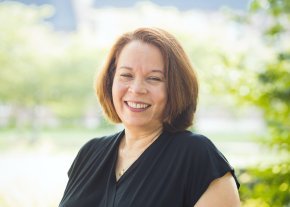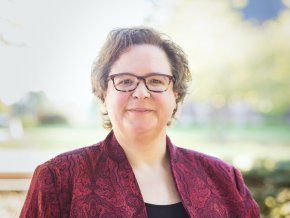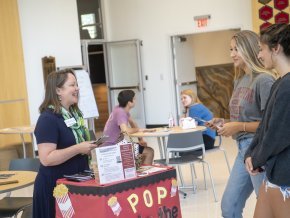
Living the Mission
Q&A with Laura Crawley, Ph.D.

Crawley joined LR in July 2022 as the inaugural vice president for mission, engagement and innovation (MEI). In this new role, she leads areas tied to the priorities of the university’s strategic plan, including admissions, student life, the Living Well Center for Vocation and Purpose, and the Office of Spiritual Life. She previously held the role of assistant vice president for academic affairs at the University of Georgia (UGA) and director of UGA’s Gwinnett Campus. Crawley earned her bachelor of arts in American studies from the University of Texas at Austin and her master’s and doctorate in women’s studies from Emory University.
Q: What drew you to working at Lenoir-Rhyne?
A: I’m a lifelong Lutheran who has been a lay leader in the church for decades, and I have a lot of friends who graduated from LR or LTSS — so I’ve known about the university from afar. While I’ve spent my career at these large public colleges and universities, my heart has always been drawn toward private liberal arts education. What really caught me, though, was President (Fred) Whitt and his vision for LR. Fred persuaded me that this role was the right thing for Lenoir-Rhyne and the right thing for me. And he was right. It’s a career dream that I didn’t even know I had until I got the call.
Q: How would you describe your role as the first VP of MEI?
A: It’s exciting to launch something new in a place with such a rich history. It’s also a little daunting. I want us to be true to that history while looking ahead to the future. My role right now is to listen and learn and to seize opportunities where they are. It’s one thing to know the mission. But to live the mission is something much deeper and richer. What I learned in my first eight weeks at LR is that we have people living that mission in everything they do and say, and I’m learning from them.
Q: What prompted you to move into leadership roles within higher education?
A: For me, it was seeing what could be done and what I could do, and then bringing those two things together. I’m very much a collaborative leader, and I love to see people bringing their skills and interests together to solve problems and achieve goals. Honestly, I think I have a natural bent for leadership. I like to see things through. I like to solve problems. I like to work with other people to make things happen. All of that leads to some leadership potential. Leadership just feels natural to me.
Q: As you come into this role, what are your priorities?
A: My priorities at this stage are to see where greater collaboration and cooperation across the different divisions that are represented in MEI can be strengthened. I’m also looking for every opportunity to partner beyond MEI. It’s so wonderful to start this new role alongside Dr. Jennifer Burris, who is open to connecting the offices within MEI and Academic Affairs. Really, I find that same spirit of openness and collaboration with all the VPs, and with President Whitt, and with so many others at LR. I guess I’ve built a career on collaborative partnerships, so I think I have a lot to offer in integrating various efforts without losing the special feel and purpose of each.
Q: What do you believe are LR’s greatest strengths? Greatest challenges?
A: I think our greatest strength is our history. I am drawn to the theological foundations of education that are expressed at Lenoir-Rhyne. Lutheran theology is all about trying to hold two seemingly contradictory ideas together. It’s all about the complexities, the questions. And that’s what education should be about. It’s not about knowing the answer. It’s about honing the questions, exploring the questions. Sometimes you’ll get an answer right, but then there’s another question waiting for you right around the corner. That’s distinctively Lutheran and embedded in the liberal arts, and I think that’s very much what LR offers.
Coming out of COVID, all higher ed institutions face some big challenges right now. We’re never going to go back to what was normal before, but we don’t yet know what normal is now. But I think that the liberal arts mission can also help us answer a lot of those challenges. At Lenoir-Rhyne we have an opportunity to build real community, to know each other. It’s not just students knowing us, but also faculty and staff knowing each other. We have an opportunity to regain and enrich that sense of community that was here before COVID, and will continue to be here in the future.
Q: How do you feel your experience in student affairs, branding initiatives, and running university programs has prepared you for your new role?
A: At LR we focus on educating the student’s whole self. So what happens inside and outside the classroom is crucial. What happens on the athletic field, in clubs and student events, and in the dorms is crucial. The accumulation of these experiences builds our students into our alumni. And these relationships also connect us with our communities, our local and state governments, and the organizations we support. Having worked in so many different areas within and outside of higher ed, I’m focused on creating opportunities for collaboration, creating opportunities for access and bringing as many people into the conversation as possible.
Q: What do you hope to contribute to the university during your tenure?
A: I want to give it my best self. I’ve never been good at partial effort, especially when I really believe in the organizations I serve. I believe in Lenoir-Rhyne as an institution. I believe in its people and its future. I may not know the details yet, but I know myself well enough to know that I’ll be giving it 110 percent.
Q: You and Dr. Burris are both women in lead roles at the university. What do you see as the value of that?
A: The reality is that more women are moving into positions of leadership across all industries, including higher education. It’s not as unusual as it may once have been. Every woman and man in a leadership role brings to it themselves, who they are, what they believe and what their experiences have taught them. The most significant thing for me throughout my career was having women mentors, and I was blessed with some really amazing mentors. I have been returning that by mentoring others. I’m always reminded of Ruth Bader Ginsburg’s quote where somebody asked her how many women should be on the Supreme Court, and she said ‘nine.’ Nobody ever asked why there were nine men. Representation matters. Diverse representation really matters. It means something to have people of color and women in leadership roles. To have LGBTQIA+ people in leadership roles. People see the potential for themselves in the examples that are set before them. I know that I have been able to do that for others as others have done that for me.

